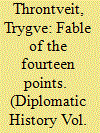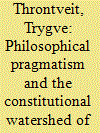|
|
|
Sort Order |
|
|
|
Items / Page
|
|
|
|
|
|
|
| Srl | Item |
| 1 |
ID:
106824


|
|
|
|
|
| Publication |
2011.
|
| Summary/Abstract |
For decades, scholars have turned to Woodrow Wilson's Fourteen Points address of January 8, 1918, to explain his vision for a new international order after World War I. And for decades, one particular phrase has been closely linked to that vision: "self-determination." The phrase, however, appears nowhere in Wilson's address. Moreover, it is often shorthand for "national self-determination," connoting an ethno-nationalist political ideal Wilson never held. Rather, Wilson idealized self-government: the right of all to help direct their society's public affairs. By 1918, Wilson sought to promote both national and international self-government through a deliberative League of Nations, equipped to accommodate changes in an increasingly interdependent global society. Prejudiced though he was, Wilson envisioned an egalitarian League, with adequate sovereign powers to advance justice within and among nations. Though Wilson poorly communicated this radical yet pragmatic ideal, it was his late abandonment of pragmatic compromise that prevented U.S. League membership. That outcome, despite its contingency, has limited American views of the nation's global role ever since.
|
|
|
|
|
|
|
|
|
|
|
|
|
|
|
|
| 2 |
ID:
126693


|
|
|
|
|
| Publication |
2013.
|
| Summary/Abstract |
AS THE DUST STILL SWIRLS, ENDLESSLY IT SEEMS, around the 2012 election, it is worth reexamining its predecessor of a century ago: the epochal election of 1912. Granted, 1912 was a four-way race, pitting Democratic and Republican nominees against challengers from the Socialist and Progressive Parties-a far cry from today's bipolar contests. Yet then as now, the political climate was highly charged, and the main question dividing the nation essentially the same: How should government protect freedom and promote opportunity while reducing inequality and ameliorating its effects? These general similarities suggest two particular reasons to study the course and consequences of the 1912 election. First, today's American system can be traced in important ways to its outcome, which put Woodrow Wilson in the White House after a sophisticated rhetorical battle that clarified his vision for American democracy and shaped the policies he devised to achieve it. Those policies laid the grounds for the American welfare state that emerged under Franklin D. Roosevelt, and thus mark, if not a constitutional revolution on the scale of the New Deal, a watershed: a diversion of ideological currents and institutional inertia that made subsequent changes possible. Second, both the campaign and Wilson's presidency were influenced, to an unrecognized degree, by a tradition of American philosophy that might offer intellectual resources for today's political tasks: philosophical pragmatism, a tradition popularized by William James and given explicit political content by his Progressive Era students and admirers.
|
|
|
|
|
|
|
|
|
|
|
|
|
|
|
|
|
|
|
|
|